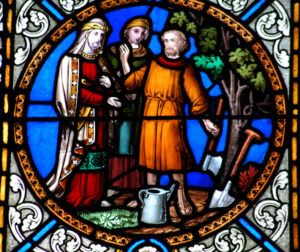Third Sunday in Lent
READINGS FOR THE WEEK
- First reading
- Isaiah 55:1-9
- Psalm
- Psalm 63:1-8
- Second reading
- 1 Corinthians 10:1-13
- Gospel
- Luke 13:1-9
The First Reading from Isaiah:
Ho, everyone who thirsts, come to the waters; and you that have no money, come, buy and eat! Come, buy wine and milk without money and without price. Why do you spend your money for that which is not bread, and your labor for that which does not satisfy? Listen carefully to me, and eat what is good, and delight yourselves in rich food.
Incline your ear, and come to me; listen, so that you may live. I will make with you an everlasting covenant, my steadfast, sure love for David. See, I made him a witness to the peoples, a leader and commander for the peoples. See, you shall call nations that you do not know, and nations that do not know you shall run to you, because of the LORD your God, the Holy One of Israel, for he has glorified you.
Seek the LORD while he may be found, call upon him while he is near; let the wicked forsake their way, and the unrighteous their thoughts; let them return to the LORD, that he may have mercy on them, and to our God, for he will abundantly pardon.
For my thoughts are not your thoughts, nor are your ways my ways, says the LORD. For as the heavens are higher than the earth, so are my ways higher than your ways and my thoughts than your thoughts.
The gospel from Luke:
At that very time there were some present who told Jesus about the Galileans whose blood Pilate had mingled with their sacrifices. He asked them, “Do you think that because these Galileans suffered in this way they were worse sinners than all other Galileans? No, I tell you; but unless you repent, you will all perish as they did.

Dungarvan, Waterford, Ireland
from Art in the Christian Tradition, a project of the Vanderbilt Divinity Library, Nashville, TN.
https://diglib.library.vanderbilt.edu/
Or those eighteen who were killed when the tower of Siloam fell on them–do you think that they were worse offenders than all the others living in Jerusalem? No, I tell you; but unless you repent, you will all perish just as they did.”
Then he told this parable: “A man had a fig tree planted in his vineyard; and he came looking for fruit on it and found none. So he said to the gardener, ‘See here! For three years I have come looking for fruit on this fig tree, and still I find none. Cut it down! Why should it be wasting the soil?’
He replied, ‘Sir, let it alone for one more year, until I dig around it and put manure on it. If it bears fruit next year, well and good; but if not, you can cut it down.'”
Sermon:
This morning Pastor Stevensen poses the question Why does God accept repentance? For an answer we can turn to our first reading. In Isaiah 55 we read Seek the LORD while he may be found, call upon him while he is near; let the wicked forsake their way, and the unrighteous their thoughts; let them return to the LORD, that he may have mercy on them, and to our God, for he will abundantly pardon. For my thoughts are not your thoughts, nor are your ways my ways, says the LORD. For as the heavens are higher than the earth, so are my ways higher than your ways and my thoughts than your thoughts.
In Luke Jesus’ words are more urgent. For unless you repent his words are more shocking and direct. But then he speaks His parable of the fig tree. The fig tree can stand for those listening to Him. The tree owner is God. The garden can be taken as the offer to repent. Older people often ask about family or others they have known. They are told to act on only those things they can control. Pastor continues by talking about spiritual pride and a feeling that God cannot forgive our sins and to conclude that God’s Son has made us free.
# # #

